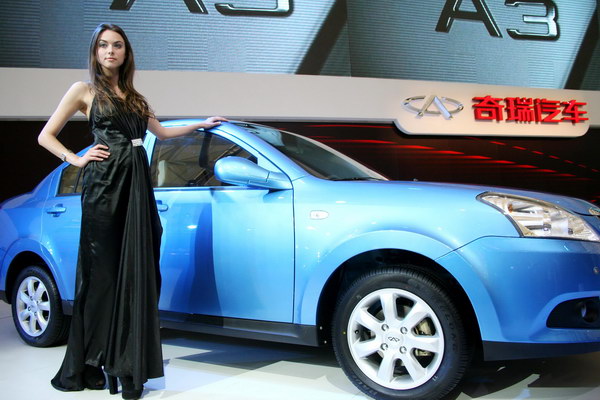Chery digs in for the long haul in Brazil
Updated: 2011-08-20 09:28
By Jose Sergio Osse (China Daily)
|
|||||||||||
SAO PAULO, Brazil - Chery Automobile Co, China's biggest auto exporter, may see "insignificant" profit margins for the next decade in Brazil, where the company is attempting to triple its market share by 2015, said Luis Curi, the chief executive officer of the Brazilian unit.
 |
|
A car made by Chery Automobile Co on display at the Shanghai International Automobile Industry Exhibition. Chery may see "insignificant" profit margins in Brazil in the next decade.?[Photo/China Daily] |
Chery wants to attain 3 percent of sales in the South American nation after production begins at a $400 million factory the company is building in Jacarei, in Sao Paulo state, Curi said in an interview on Thursday.
The company, based in Wuhu, Anhui province, expects to sell about 30,000 vehicles in Brazil this year. The new plant, scheduled to start production in the second half of 2013, would add capacity to make between 150,000 and 170,000 cars annually, Curi said.
"The Chinese market already guarantees Chery its profitability, so here in Brazil we're at the stage of buying market, working with insignificant profit margins," he said.
"For the next 10 years we don't see, we don't expect, a financial return. These will be 10 years of investment. The profit margins come only after that."
Chery has to have profit margins that let it work at break-even, while avoiding the need to work at a loss in Brazil, he said.
The Brazilian market share of Chinese automakers has expanded to 3.29 percent this month, from virtually zero in April 2010, according to data from the national car dealers association known as Fenabrave.
Chery was the first of the new wave of Chinese car manufacturers to set foot in Brazil, in May 2010, and was followed by Chongqing Lifan Auto Co in December and Anhui Jianghuai Automobile Co's JAC Motors in March.
Chery has 82 dealers in Brazil, Curi said, and expects to boost the number to 150 next year. The company foresees sales of between 30,000 and 35,000 cars in 2012. Chery increased its market share to 1.1 percent in mid-August from 0.15 percent in May 2010, according to Fenabrave. In 10 years there will be significant changes in the top ranking of automakers in Brazil, Curi said. By then, Chery expects to have reached enough production momentum to scale down costs, improve margins and attain its goal of being among the top five automobile companies in the country.
"There's already a clear loss of share among the four leading manufacturers," said Curi in reference to Fiat SpA, Volkswagen AG, General Motors Co and Ford Motor Co. "It has been a gradual, but consistent, process and this is clearly a trend."
"Traditional" automakers, which will increase their sales, will cede market share as new companies such as Chery enter the nation and boost investment and production, Curi said.
On Aug 1, JAC Motors said it will build a $600 million factory in the country. The Asian automakers Nissan Motor Co, Mitsubishi Motors Corp and Hyundai Motor Co also announced broader investments in Brazil, while Germany's Bayerische Motoren Werke AG said its considering a production line in Brazil.
The potential of a weaker second half for the Brazilian economy has yet to be felt by Chery, where consumer demand remains unchanged. The increased capital requirements for credit to buy cars that were imposed in December by the government of Dilma Rousseff are already "diluted", according to Curi.
"There's still plenty of credit," he said. "As for the worsening of the crisis, expected for the second semester, we still haven't felt the effects in a stronger manner in our network. So much that orders for China remain at the same level as before."
Brazil is today the biggest market for Chery outside China.
The company's rate of purchase from its Chinese parent hovers around 4,000 vehicles a month, with practically no stock in the country, Curi said.
"What arrives in Brazil is practically already sold," Curi said, explaining that there's a hiatus of about four months between the order and the actual arrival of a car at a Brazilian port.
Curi said he expects tougher competition in Brazil from well-established car manufacturers rather than other companies new to the market. The kind of vehicle Chery brings to Brazil fits into the "popular" category of subcompacts, small sedans and hatchbacks, much different from the larger, pricier cars sold by other newcomers and importers, Curi said.
"It's tougher to compete with the ones that are already here, because of the kind of product we're selling," Curi said.
"Chery was the first to come with relative strength to this market, which accounts for 70 percent of the sales in Brazil."
Bloomberg News
Related Stories
Chery exports hit all-time high in July 2011-08-05 17:53
Chery Auto more than doubles foreign sales 2011-07-12 15:13
Chery to open Kenyan plant 2011-08-12 16:26
China, Brazil open wider for each other 2011-05-17 13:21
- Race is on for new generation of supercomputer
- China pledges no hard-landing
- Incubating a biotech future for tomorrow
- Tudou slides 12% after Nasdaq debut
- New home front opens up in divorce
- China Mobile talking to Apple on iPhones
- Program to facilitate SMEs's financing
- Shuanghui H1 net profit plunges













